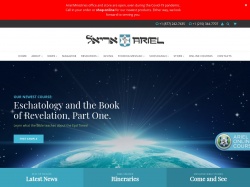Two new theological statements, one from the Vatican and one from the Center for Jewish-Christian Understanding & Dialogue (CJCUC), call for a theological “cease fire” to the interfaith conflict that has characterized the relationship between the church and the Jewish people for most of the last two thousand years.
The Catholic Church celebrated the fifty-year anniversary of the Second Vatican Council (1965) and the release of Nostra Aetate, a theological paper that redefined the church’s relationship with the Jewish people. Part of the fifty-year celebration included the publication of a new paper from The Vatican’s Commission for Religious Relations with Jews. The new document, titled “The Gifts and Calling of God Are Irrevocable,” was presented at the Vatican on Thursday, December 10, 2015, the fourth day of Chanukah 5776. The paper derives its name from Paul’s words in Romans 11:29 where the apostle concedes that, although most Jewish people in his day had not acknowledged Yeshua of Nazareth as the Messiah of Israel, nevertheless, they remained God’s chosen people and in covenant relationship with God because “the gifts and the calling of God are irrevocable” (Romans 11:29). The new paper ostensibly revisits and clarifies the intentions of Nostra Aetate, but it also incorporates new, progressive thought on the intersection between Judaism and Christianity and on Jewish-Christian relations in a post-replacement theology world.
The new paper recapitulates the story of the release of Nostra Aetate and summarizes major events and progress in Catholic-Jewish cooperation and dialogue since Vatican II. It proceeds into new theological territory by comparing Christ and the Torah as two distinct but mutual expressions of the same pre-existent “Word of God.” It corrects misunderstandings about the new covenant supplanting or invalidating the old covenant, and, along the way, offers corrections to common misreadings of the book of Hebrews. It maintains the New Testament position on salvation through Messiah alone, but it leaves the door open to a wide hope, especially for the Jewish people who remain under God’s unrevoked covenant with Israel.
In light of these statements, the paper disavows institutional proselytizing missions toward the Jewish people, but it maintains Christian responsibility to bear witness to faith in Yeshua to all people. The paper concludes with a summary of objectives for future dialogue. The whole of the paper is filled with astonishing statements that challenge conventional church theology and point toward a more Jewish understanding of the New Testament and Israel.
You can read the paper online: “The Gifts and Calling of God Are Irrevocable”
On the whole, the response from Jewish voices has been generally positive. For example, consider the preemptive reply from Modern Orthodox Judaism. On December 3 of 2015, (a week before the Vatican released their paper) the Center for Jewish-Christian Understanding & Cooperation (CJCUC) released an equally progressive statement titled “To Do the Will of Our Father in Heaven: Toward a Partnership between Jews and Christians.”
The CJCUC statement comes from the circle around the controversial chief rabbi of Efrat, Rabbi Shlomo Riskin, a leading voice in Modern Orthodoxy and a proponent of interfaith dialogue between Christianity and Judaism. He is also the chancellor and founder of the CJCUC, an initiative that sponsors mutual reconciliation between Christians and Jews. The statement calls upon Jewish religious leaders to set aside hostility toward Christianity and accept Christians as co-religionists in the service of God. Drawing on the opinions of respected Jewish leaders from the past like Maimonides and Rabbi Jacob Emden, the document attempts to recast the relationship between Judaism and Christianity, and it calls upon ordained members of Orthodox Judaism and Modern Orthodoxy to add their names to the declaration. The document acknowledges the theological changes and interfaith overtures the Catholic Church has made since releasing Nostra Aetate.
You can read the paper online: “To Do the Will of Our Father in Heaven”
Not everyone is equally enthusiastic about the new statements, but from our perspective at First Fruits of Zion, we see both as tokens of a paradigm shift that is slowly taking place in both Christianity and Judaism, a shift that is ultimately in concert with our expectation of the revelation of Messiah in the coming kingdom. Watch for our analysis of both papers in the next edition of Messiah Journal.
Source: First Fruits of Zion



